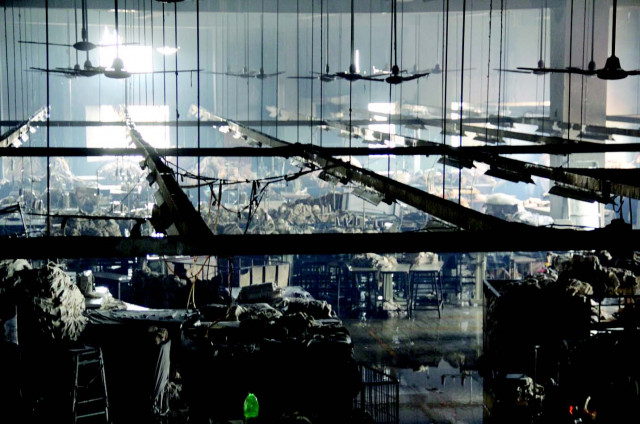Burnt factories, charred lives and shop floors
Shop floor conditions in factories in Pakistan vary, writes one expert۔

A few years ago when I was conducting fieldwork in urban Punjab, specifically in Faisalabad, Sheikhupura and Sialkot, interviewing heads of various textile and garment factories and quietly observing shopfloor dynamics, I was struck by the highly discriminating treatment of labour across factories of different sizes and specialisations.
The majority of factories I had visited were export-oriented firms firmly entrenched in a hierarchy of global supply chains. While some firms like [...] were positioned at the upper end of the value chain as direct suppliers to global retail brands and buyers such as JC Penney and Tommy Hilfiger, many others were wedged at the lower end of the chain struggling to establish direct links with foreign buyers and trying to remain competitive in an increasingly cut-throat market of liberalized world trade. The latter category of firms encompassed upstream suppliers to either large firms like [...] or to individuals who acted as middlemen for international buyers. Labour relations across the range of the value chain and firm size varied considerably.
Typically this is what I observed: if the firm was big, resourceful and had a philanthropically minded CEO who was intimate with his global buyers, then overall conditions on shopfloor were good. By ‘good’ I mean they provided employees quality working conditions and generally paid above the minimum wage; the female workers were offered free pick-and-drop facilities; all workers received subsidised on-site medical care; the production operations did not conform to the ‘sweat shop’ image; and the facilities could justifiably have been regarded as world class.
Such firms were keen to secure quality certifications because management understood these critical steps would enhance the firm’s position as a dominant supplier to global retailers. The CEOs knew if ethical considerations were not heeded they would lose contracts with clients like Ikea or Nike, who were already under pressure from international NGOs over corporate codes of conduct.
At the lower end of the value chain hierarchy lay a vast network of firms who produced small, customised orders and standardised products based entirely on low price rather than high quality and product differentiation. The managers’ approach differed to the extent that their primary concern was providing low-cost goods.
These firms were not concerned with ISO certifications or labour standards and this was reflected in the conditions I observed on the shopfloor: poorly lit rooms, gritty working conditions, lack of ventilation.
These firms operated with a mindset that affirmed the primacy of business goals over the needs of workers. If these divergent morphologies and business styles situate firms differently along the global supply chain pecking order, then the common denominators that constitute these firms into a singular frame are diminishing levels of unionisation, the chimera of state regulation and the desire to escape the so-called ‘rigidities’ imposed by government tax and labour regulations.
Over the past twenty years the evisceration of labour laws in Pakistan and the prevention of social conflict by means of repressing worker protests have broadly created a system that manages labour and responds primarily to the needs of capital.
Moreover, the change in Pakistan’s industrial landscape and labour relations has not only made the lives of the working class more precarious but is also conveniently aligned with a business-cultural ethic that has depoliticised labour relations through the trope of ‘corporate social responsibility’ and the rise of market-driven private regulation, ie codes of conduct adopted by brands and retailers and social audits of their suppliers.
While private regulation endeavours to set uniform standards for labour conditions, extensive evidence from countries across the global South shows that enforcement of such regulation is inextricably tied to state regulation. Market pressure alone does not affect significant changes, and social audits do not ameliorate worker abuse. Managerial assumptions such as linking quality control and productivity management techniques with abuse often remain intact on the shopfloor.
I recall a conversation a few years ago with a well-educated woman who waxed lyrical about her designer friend who “never gives [her workers] a break under any circumstances. They can’t take even a tea break. Isn’t that great? ... She’s a fabulous businesswoman.” The dehumanisation of labour in Pakistan straddles multiple domains: from the world of advertising and designers whose fortunes are tied to the prosperity and consumptive desires of a rising urban middle and upper-middle class, to export-oriented factories entangled in asymmetrical power relations with global buyers, with only a select few surviving in the cut-throat global fashion industry.
There is always a nudging hope that such firms will respect the dignity and livelihoods of their workers, as I had found for instance in the case of [...] in Faisalabad. However, real changes for improving labour conditions cannot arise through managerial discretion and private regulation. Substantive change will have to come through state intervention and the enforcement of labour laws. Private regulation and local laws are inextricably linked because the quality and meaning of private regulation is predicated on the interactions that are catalysed by state regulation. It is time that we understood and took seriously that labour governance in Pakistan cannot leave behind the state. The costs of not doing so are already palpable in the devastating tragedy that struck a factory in Karachi, and the sentiments of a grief-stricken mother who poignantly cried: “...the owner locked the door to protect his wealth. But he took away my wealth. He took away my son...”
Published in The Express Tribune, September 19th, 2012.



















COMMENTS
Comments are moderated and generally will be posted if they are on-topic and not abusive.
For more information, please see our Comments FAQ